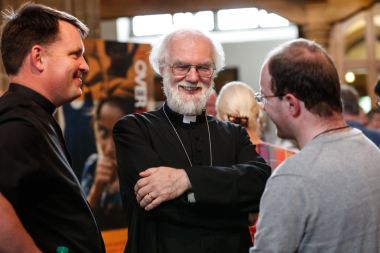Rowan Williams: Don't let secularists drive religion out of public life

Former Archbishop of Canterbury Dr Rowan Williams has warned against excluding religious voices from the public square in debates on social and moral issues.
Delivering the inaugural Cambridge Coexist Theology Lecture at the Cheltenham Literature Festival, Dr Williams spoke of a perceived conflict between religion and the "language of rights".
He said that appeals to religious liberty in cases where the convictions of people of faith conflicted with those of the majority of society were "increasingly under suspicion" from a secularist critique which sought to exclude religious perspectives.
However, he said "communities of faith" could not expect to have a "casting vote" in a liberal society and should accept that their role was to contribute to a wider debate rather than to determine its outcome.
Dr Williams based his argument on the principle of "legal universalism", which guarantees all citizens rights of protection and redress. He said that this implies a "robust and deep-rooted language about human dignity". Religious communities should be "invited to a place at the table", and able to "lend to the secular environment something of the edge and the imagination that their doctrines produce".
He argued for a "halfway house" between a confessional society in which laws were based on religious principles and a systematically secular one in which religion "should never be spoken about outside the front door". The state, he said, should "broker conversations" so that the views of minorities were taken seriously and allowed to contribute to wider debates.
Christians and other people of faith, he said, should not expect the legislature to assent to everything they were saying, but it was important that certain elements in a discussion were on the table and that the principle of human dignity was upheld. "It really helps in a public debate, even if you lose the argument, to have certain principles embodied in it," he said.
He referred to a recent House of Lords debate about assisted dying, which he said was about what best preserved human dignity: "In a long and highly complex debate, there were signs that this was the territory on which the best and most interesting speakers were operating.
"It really helps in a public debate, even if you lose the argument, to have certain principles embodied in it. The task of religious representatives is not to win the argument at all costs. It is to say, it needs to be this kind of argument rather than that one."
He concluded: "A society committed to law and rights ought to be a society profoundly interested in the welfare of religious communities and one that realises it needs religious insights."











